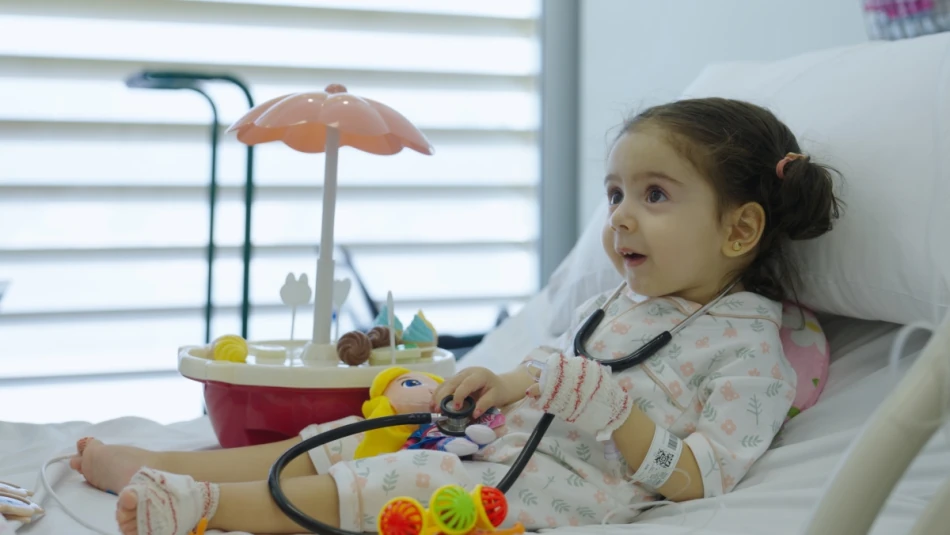
Breakthrough Treatment: 'Yaqeen' Receives First Dose of 'Zolgensma', Embarking on Healing Journey
Dubai's Medical Diplomacy: $2 Million Gene Therapy Highlights UAE's Healthcare Leadership
A Syrian child with spinal muscular atrophy received the world's most expensive drug treatment in Dubai this week, courtesy of Sheikh Mohammed bin Rashid Al Maktoum's personal intervention. The case of Yaqeen Ibrahim Kanakar, who received a $2 million Zolgensma gene therapy dose, underscores the UAE's growing role as a regional healthcare hub and its strategic use of medical diplomacy to project soft power across the Middle East.
The World's Most Expensive Medicine Finds a Home in Dubai
Al Jalila Children's Hospital administered the single intravenous dose of Zolgensma to young Yaqeen on Friday morning, marking another milestone in Dubai's emergence as a center for cutting-edge medical treatments. The gene therapy, which costs over 7 million dirhams ($1.9 million), represents one of the most advanced treatments available for spinal muscular atrophy, offering children a genuine chance to regain motor function when administered early.
The hour-long procedure will be followed by a comprehensive medical monitoring program involving regular visits to track the child's health improvements. This personalized approach reflects Dubai's broader strategy of positioning itself as a destination for complex, high-value medical interventions that many regional healthcare systems cannot provide.
Dubai's Track Record in Rare Disease Treatment
Al Jalila Children's Hospital has now treated over 100 cases of spinal muscular atrophy patients over five years, with the first case treated in 2020 involving a five-month-old girl. This volume places Dubai among the leading centers globally for this rare genetic condition, competing with established medical hubs in the United States and Europe.
The numbers tell a compelling story: treating 100 cases of such a rare condition represents a significant concentration of expertise and resources. For comparison, many European countries might see similar case volumes across their entire healthcare systems, yet Dubai has consolidated this expertise within a single institution.
Building Medical Infrastructure as Strategic Asset
Dr. Mohammed Al Awadhi, Executive Director of the Women and Children's Health Complex at Dubai Health, emphasized that providing treatment for over 100 spinal muscular atrophy cases reflects Dubai Health's commitment to delivering high-quality care that meets the best standards for every child. This integrated care model addresses patient needs across medical and humanitarian aspects under one roof.
The approach mirrors Singapore's strategy of becoming a regional medical hub, but with a distinctly Middle Eastern character that emphasizes humanitarian outreach to conflict-affected populations. Unlike Singapore's primarily commercial medical tourism model, Dubai appears to be blending commercial excellence with strategic soft power projection.
Gene Therapy as Geopolitical Tool
Dr. Haitham Al Bashir, Pediatric Rehabilitation Consultant at Al Jalila Children's Hospital, explained that Zolgensma represents advanced gene therapy technology that gives children with spinal muscular atrophy a real opportunity to restore motor abilities at an early age. The treatment forms part of a comprehensive medical plan supervised by multidisciplinary teams.
The case highlights how access to cutting-edge medical technology has become a form of geopolitical influence. While the United States and European Union often use economic sanctions and diplomatic pressure, the UAE leverages medical diplomacy to build relationships and demonstrate its values to regional populations.
The Human Impact of Medical Diplomacy
Ibrahim Kanakar, Yaqeen's father, expressed profound gratitude to Sheikh Mohammed bin Rashid Al Maktoum for covering his daughter's treatment costs. "We don't feel like we're outside our homeland. The UAE has embraced us as a family and stood by us like no one else has," he said, capturing the soft power impact of such interventions.
The father's emotional response—describing sleepless nights from joy rather than worry—illustrates how medical diplomacy creates lasting emotional bonds that transcend traditional diplomatic relationships. This personal connection between ruling leadership and individual families creates powerful narratives that resonate across the Arab world.
Market Implications and Healthcare Economics
The economics of providing $2 million treatments reveal Dubai's strategic calculations. While the immediate cost is substantial, the long-term benefits include attracting medical talent, building institutional expertise, and creating positive international publicity that far exceeds traditional marketing expenditures.
For healthcare investors, Dubai's approach signals a mature market willing to invest in high-value, low-volume treatments that build institutional reputation. This contrasts with healthcare systems focused purely on volume or cost-containment, suggesting opportunities for specialized medical technology companies.
Regional Competition and Differentiation
Yaqeen's mother, Haifa Abdulaziz Forouj, noted that "The UAE wasn't just a country we sought refuge in, but a homeland that opened its heart to us and embraced our daughter in her most difficult moments." This emotional testimony reflects Dubai's success in differentiating itself from other regional medical destinations through personalized, leadership-driven interventions.
Unlike Saudi Arabia's more institutional approach to healthcare development or Qatar's focus on research and education, Dubai's model emphasizes direct, personal connections between leadership and patients. This approach may prove more sustainable in building long-term relationships with regional populations seeking advanced medical care.
The Future of Medical Diplomacy in the Gulf
The Yaqeen case represents more than individual charity—it demonstrates how smaller Gulf states can leverage medical excellence to project influence beyond their geographic and demographic limitations. As regional conflicts continue and healthcare needs grow, Dubai's model of combining commercial excellence with humanitarian outreach may become increasingly attractive to other Gulf states seeking to expand their soft power capabilities.
The success of this approach will ultimately be measured not just in individual lives saved, but in Dubai's ability to attract medical talent, build institutional expertise, and create lasting relationships that serve broader strategic objectives in an increasingly complex regional environment.
Most Viewed News

 Sara Khaled
Sara Khaled






